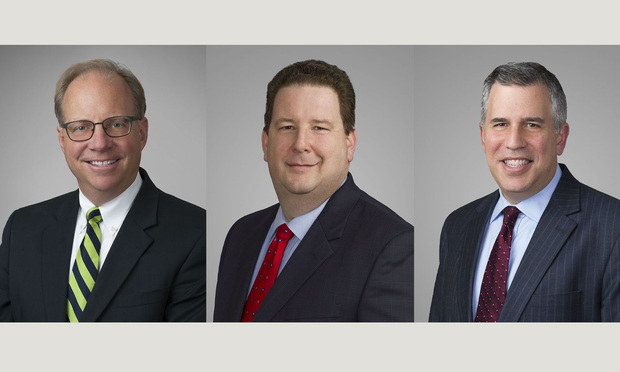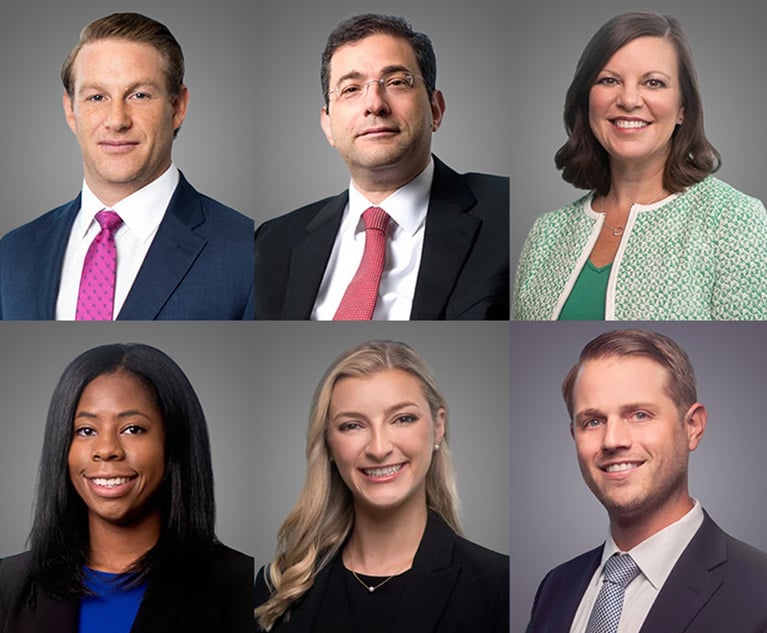Heath Care and Employment Focus Spells Busy Times for Epstein Becker & Green
The 250-attorney firm, which recently inked an international alliance with Deloitte Legal, has a practice mix that's placed it in high demand amid the COVID-19 crisis.
March 27, 2020 at 03:33 PM
7 minute read
 (l-r) Mark Lutes, Jim Flynn and David Garland. (Courtesy photos)
(l-r) Mark Lutes, Jim Flynn and David Garland. (Courtesy photos)
While many full-service law firms contend that their diverse offerings keep them well-hedged in times of upheaval, it's fair to say that many of their practices have stumbled into a quiet phase.
Other, more specialized players are finding that the current economic and public health crisis sparked by the coronavirus plays directly to their practice strengths.
That's the case for 250-attorney Epstein Becker & Green, which offers clients a dual focus on health care and employment law. The timing of the firm's 10-month old alliance with Deloitte Legal has also proved fortuitous, giving clients access to the Big Four firm's worldwide capabilities to help navigate an emergency that's indifferent to national boundaries.
Washington, D.C.-based chair Mark Lutes; Newark, New Jersey-based managing director Jim Flynn; and New York and New Jersey-based national employment, labor and workforce management steering committee chair David Garland spoke with ALM this week about what their workload currently looks like.
I imagine it's been a very busy couple of weeks for all of you.
Jim Flynn: It really has been. Our core areas of labor, employment and health care are at the nexus of what's going on here. And our lawyers have been in extremely high demand, simply for health care entities to continue to function, protect their own workers, protect patients and deal with all of these new things.
Do you have any specific examples?
Mark Lutes: I think there's two phases that we have a unique position in. One is the immediate needs across our client base. The second is those that are beginning to emerge: we're hearing a lot of interest, particularly from investors in health care and some of the providers that are online, in what the post-corona or less-acute phase is going to look like. There is an immediate short-term need to work with the Centers for Medicare and Medicaid Services to get what CMS would call regulatory flexibility, so that operations can continue even in situations where normal access points to caregivers aren't available. We are fielding innumerable questions now from investors and from providers about how they should prepare to access the funding that has been made available by Congress to eligible health care providers for health care-related expenses or lost revenues that are attributed directly attributable to the coronavirus.
JF: Let me use the telemedicine, telehealth example. Mark talked about making sure that regulatory-side people are doing it the right way, getting the right approvals. More importantly, from the client perspective, is being able to get paid for it. What we bring to that is then the ability to say on the labor and employment side, "Is your staff trained to do it? Is this helping and increasing social distancing? To the extent that you're in a unionized setting, is there anything we need to do to make sure that we can implement this and have your employees trained to do it, whether those are physicians, nurses, physician assistants or nurse practitioners?"
When did you realize the potential for disruption to your client base posed by COVID-19? And did you take any measures to ramp up?
JF: We posted one of our first articles about the potential impact of COVID-19 in January, so we were a little ahead of the curve.
David Garland: A lot of firms have put together what they refer to as resource centers. But because of the nature of our firm, our resource center combines probably more material on the labor and employment and the healthcare side than any firm. What Deloitte brings to us, as well, is the global perspective on what's happening. We did a webinar about 10 days ago, where we had Deloitte speakers from, among other places, China. One of the things the speaker from China told us was that public schools just reopened in his region in Shanghai. We're trying to anticipate some of the things we're now seeing in the United States, so we're trying to provide some notion of where the light may be at the end, and we were doing that at a time before a lot of these lockdowns were in place.
Because of all the demand right now and the fact that this crisis hits on so many of the firm's key areas, do you have the expertise you need in order to serve your clients? Are there prospects for further hiring at the moment?
ML: We expect that there will be additional partners interested in joining the platform, who have clients that have the types of needs that we can address. They have clients that know that they're going to have to interface with CMS. Going forward, they know that they're going to want to access government funds, just to give two examples.
JF: On the flip side of that, because we're not a general service firm, we're not threatened and we frequently partner with other law firms as well. We don't have any problem coordinating the delivery of services and advice for clients who may use others in different areas that we don't deal with.
ML: If you were to do a survey of large corporate transactional firms, you'd get a great response as to how comfortable they've grown over the years in reaching out for us to fill in where there's a need for in-depth expertise in labor and employment and in health care.
Are you well-positioned to withstand a potential sustained economic downturn? Are there any particular preparations that you find yourself making to prepare for those contingencies?
JF: Look, we understand that many firms, many clients are going to face financial difficulties. But, frankly, we're open and doing business, even if not in our offices, for existing clients. We've taken on a lot of new clients and we're doing business with both over the last couple of weeks. We don't have any current plans for layoffs of lawyers or staff. Obviously, we're prudent and we'll continue to monitor the situation, both its intensity and its duration. But I think we'll get through this period, as we have other difficult periods in the past.
Were there any inquiries or needs from clients that you didn't initially anticipate but had to quickly get up to speed on?
JF: Certainly, we all knew that anything that was antiviral or vaccine-related would continue and have to move forward. But what we saw was that social distancing policies were complicating study protocols because a lot of studies require people to come into places and check in. It wasn't top of mind for most people, even for most of our health care and life science folks.
DG: We're always constantly advising our clients on changes in employment law, but now we're doing it at warp speed. Almost every day, there's a new development coming out of Congress. Today, the Senate's gonna be passing this additional legislation. And our folks are going through it right now, analyzing it so that we can tell our clients immediately what the practical impact is on them. I don't know that that's necessarily new, but the speed at which we have to do it and be able to adjust and distill it into practical advice, that's something that we are doing constantly.
This interview has been edited for clarity and length.
Read More
After Deloitte Alliance, Epstein Becker Reels In a Big Fish From Proskauer
'Survival Mode' Is Now for Some Law Firms, While Others Plan and Wait
In-House Lawyers to Big Law: Enough Already With the Coronavirus Webinars
This content has been archived. It is available through our partners, LexisNexis® and Bloomberg Law.
To view this content, please continue to their sites.
Not a Lexis Subscriber?
Subscribe Now
Not a Bloomberg Law Subscriber?
Subscribe Now
NOT FOR REPRINT
© 2025 ALM Global, LLC, All Rights Reserved. Request academic re-use from www.copyright.com. All other uses, submit a request to [email protected]. For more information visit Asset & Logo Licensing.
You Might Like
View All
Sheppard Mullin, Morgan Lewis and Baker Botts Add Partners in Houston
5 minute read

Sheppard Mullin Expands in Dallas With 6-Lawyer White Collar Team From Bradley
3 minute read
Longtime Reed Smith Health Care Partner Opts for Solo Practice Over Retirement
3 minute readLaw Firms Mentioned
Trending Stories
Who Got The Work
J. Brugh Lower of Gibbons has entered an appearance for industrial equipment supplier Devco Corporation in a pending trademark infringement lawsuit. The suit, accusing the defendant of selling knock-off Graco products, was filed Dec. 18 in New Jersey District Court by Rivkin Radler on behalf of Graco Inc. and Graco Minnesota. The case, assigned to U.S. District Judge Zahid N. Quraishi, is 3:24-cv-11294, Graco Inc. et al v. Devco Corporation.
Who Got The Work
Rebecca Maller-Stein and Kent A. Yalowitz of Arnold & Porter Kaye Scholer have entered their appearances for Hanaco Venture Capital and its executives, Lior Prosor and David Frankel, in a pending securities lawsuit. The action, filed on Dec. 24 in New York Southern District Court by Zell, Aron & Co. on behalf of Goldeneye Advisors, accuses the defendants of negligently and fraudulently managing the plaintiff's $1 million investment. The case, assigned to U.S. District Judge Vernon S. Broderick, is 1:24-cv-09918, Goldeneye Advisors, LLC v. Hanaco Venture Capital, Ltd. et al.
Who Got The Work
Attorneys from A&O Shearman has stepped in as defense counsel for Toronto-Dominion Bank and other defendants in a pending securities class action. The suit, filed Dec. 11 in New York Southern District Court by Bleichmar Fonti & Auld, accuses the defendants of concealing the bank's 'pervasive' deficiencies in regards to its compliance with the Bank Secrecy Act and the quality of its anti-money laundering controls. The case, assigned to U.S. District Judge Arun Subramanian, is 1:24-cv-09445, Gonzalez v. The Toronto-Dominion Bank et al.
Who Got The Work
Crown Castle International, a Pennsylvania company providing shared communications infrastructure, has turned to Luke D. Wolf of Gordon Rees Scully Mansukhani to fend off a pending breach-of-contract lawsuit. The court action, filed Nov. 25 in Michigan Eastern District Court by Hooper Hathaway PC on behalf of The Town Residences LLC, accuses Crown Castle of failing to transfer approximately $30,000 in utility payments from T-Mobile in breach of a roof-top lease and assignment agreement. The case, assigned to U.S. District Judge Susan K. Declercq, is 2:24-cv-13131, The Town Residences LLC v. T-Mobile US, Inc. et al.
Who Got The Work
Wilfred P. Coronato and Daniel M. Schwartz of McCarter & English have stepped in as defense counsel to Electrolux Home Products Inc. in a pending product liability lawsuit. The court action, filed Nov. 26 in New York Eastern District Court by Poulos Lopiccolo PC and Nagel Rice LLP on behalf of David Stern, alleges that the defendant's refrigerators’ drawers and shelving repeatedly break and fall apart within months after purchase. The case, assigned to U.S. District Judge Joan M. Azrack, is 2:24-cv-08204, Stern v. Electrolux Home Products, Inc.
Featured Firms
Law Offices of Gary Martin Hays & Associates, P.C.
(470) 294-1674
Law Offices of Mark E. Salomone
(857) 444-6468
Smith & Hassler
(713) 739-1250










